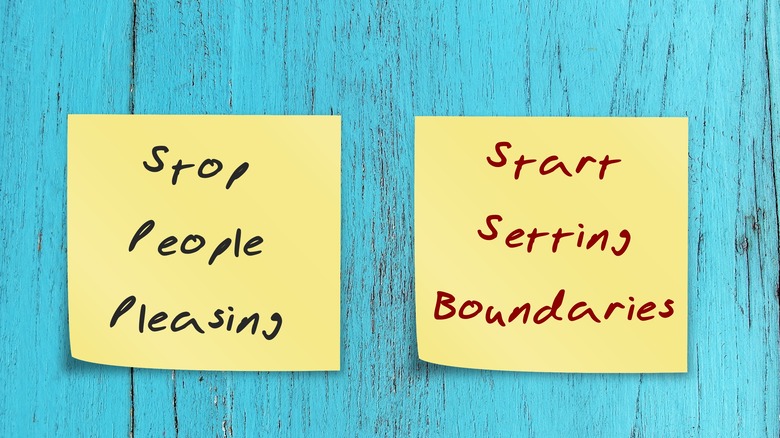A Therapist Shares 3 Ways To Navigate Difficult Family Relationships During The Holidays
For some, going home for the holidays is a gift wrapped in warm nostalgia and cherished tradition. But for those with strained familial relationships, the idea of spending the holidays with family can be daunting — bringing up feelings that we would just as soon keep buried forever if it weren't for a deep-rooted sense of obligation.
In a 2019 survey commissioned by Joy Organics, 88% of Americans deem the holiday season as the most stressful time of year. A whopping 35% of those people identified family events as the main source of that stress (per Study Finds). Maria A. Mirabella, a licensed marriage and family therapist (LMFT), says that if you're in that camp, you're in good company.
"It is extremely common for people to experience negative or difficult emotions about seeing certain family members during the holiday season. Whether it is your immediate family, extended family, or partner's family, you may experience these emotions, but it is important that you manage them appropriately. This topic tends to come up during many of my sessions starting in mid-October, when people are beginning to prepare for Thanksgiving and slowly try getting in the holiday spirit."
In an exclusive interview with Heath Digest, Mirabella shares her expert tips on how you can jingle bell rock your way through the holidays and protect your energy like a pro.
Setting boundaries
"Navigating through unhealthy relationships is never an easy situation and it takes a lot of mental preparation," says Mirabella. "My first tip for someone experiencing this is to take time beforehand to reflect on the reason they may have the feelings they do towards that person. Figure out what about that person triggers them so much to create those negative emotions. Once they have figured that out, they will need to decide what boundaries need to be implemented within that relationship. The goal of those boundaries, whether they are intellectual, emotional, or physical, is to prioritize your mental health and peace of mind!"
Those who struggle with setting boundaries often do so because they fear letting others down, or they've been socially conditioned to sacrifice their well-being for someone else's (per Psychology Today.) But Mirabella explains that setting boundaries isn't about neglecting the needs of others. Rather, it's about honoring our own needs.
"Creating this new mindset will allow you to feel more confident and secure when you are around that person. It will prepare you to know exactly which boundaries may need to be implemented to maintain a neutral setting." And for those who have the support of a partner, she recommends asking them to get on board with you. "Express to your partner the boundaries that you are looking to set, why you believe they may help you navigate through this difficult relationship, and what your partner may do during that situation to be supportive."
Stay away from touchy subjects
Whether it's differing political views or past grievances, we all have some topics we never bring up around certain family members. Mirabella says that identifying these topics beforehand can arm us with the ability to avoid conflict. "When spending time around this person, avoid those conversations or disengage from the conversation if someone else initiates it. There may also be specific conversations that you may be willing to have but are unsure of how you may respond to comments or feedback provided. It is best to avoid those conversations to ensure that no negative interactions could take place. Keep in mind the idea is to be cordial and make the best of the situation!"
Mirabella says that if you have a partner with you, also letting them know what topics you want to avoid, and with whom, can add a layer of vigilance.
"As a reminder, you do not have control over every situation, and some of these topics may come up out of your control," says Mirabella. "By pinpointing those topics, you will know which conversation you may or may not feel comfortable engaging in. If one of those topics does come up, think of how you would want to handle those situations to respectfully excuse yourself without creating tension."
Be aware of your surroundings
Family dynamics can be tricky, often layered with allegiances and primal urges to protect and defend those close to us. Mirabella says that staying aware of who is closeby can protect us from uncomfortable situations. "Keep in mind who will be attending these family functions and who is around you when you interact directly with the person with whom you have an unhealthy relationship. Unfortunately, there may be family members who try to stir the pot to create more conflict or issues between the two of you."
And while you may be inclined to involve other family members in a quest for support or validation, Mirabella urges you to resist. "It may lead to having others feel they need to pick sides." She also says to keep in mind that although there may be some people there who know how hard this relationship is for you, "Do not have expectations that they act or behave a certain way towards the person you do not get along with."
"Keeping all these things in mind will allow you to create a safe place, even in an environment you are not truly comfortable in," Mirabella explains. "It will reduce your expectations of others, build awareness, [keep you from falling] into toxic traps, and create the space and boundaries needed to get through the situation in a healthy way. Remember the people you trust and whom you consider your support system during the difficult times of navigating with these relationships. Eventually, the long-term goal should be to have an effective conversation with the other person to discuss the issues, feelings ,emotions, and resentments created to hopefully begin repairing that relationship as best as possible!"
To learn more about Maria A. Mirabella, LMFT, visit her website or her Psychology Today profile. To keep up with her, follow her on Facebook and Instagram.




